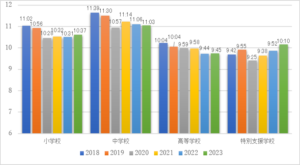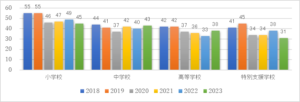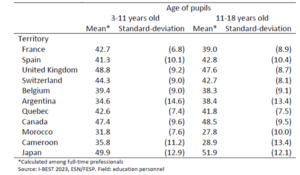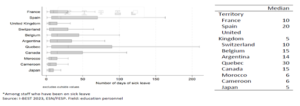- Home
- Urgent! School is crisis in Japan, especially ensuring teachers’ well-being — evidenced by the JTU survey and I-BEST
ABOUT JTU
Urgent! School is crisis in Japan, especially ensuring teachers’ well-being — evidenced by the JTU survey and I-BEST
2023/12/05
The results of OECD’s TALIS 2013 evidenced that teachers in Japan worked longest among the OECD countries. The JTU survey 2023 and I-BEST revealed that the situation has not changed and teachers working conditions should be improved immediately for ensuring well-being of teachers and quality education for all the children.
JTU annually implements survey on working-hours and working-conditions since 2018. Among the 4 kinds of schools, lower secondary school teachers work longest. In 2023, they daily work 11 hours and 3 minutes at school and 43 minutes at home on weekdays (table 1 and 2), which mean they work 11 hours and 46 minutes a day on weekdays. These figures have not been improved almost at all since the 1st JTU survey held in 2018.


Law on Special Measures on Salaries of Education Staff of Public Compulsory Schools stipulates that the teachers are NOT paid for overtime work. Principals are able to make orders of overtime work to teachers on the 4 occasions.
- practices outside of school facilities
- school trips
- teachers conference
- emergencies
Including the 4 occasions, the teachers monthly receive adjustments of additional 4% of regular pay. In fact, teachers do overtime work including preparations for teaching, marking, out-of-curriculum activities after classes and others as shown below. But all of them are regarded as ‘volunteer’ and not paid any. JTU has demanded to fundamentally amend this law, increase the number of teachers, reduce teachers’ workload and newly introduce overtime work pay to teachers.
Ministry of Education has amended the law to cap working-hours. But the JTU survey in 2023 showed this new policy is not effective and not a solution for this urgent matter. The ministry also issued ‘Emergency measures for work style reform in schools’ and pointed out that there were some business that other entities other than schools should cover; monitoring students coming to schools, monitoring students in the community after school, collecting and managing money from parents and communicating volunteers in the community. This is just a statement, therefore JTU demand radical amendment of the law itself to effectively respond this issue.
JTU also joined the I-BEST (International Barometer of Education Staff, organized by Fondation d’entreprise MGEN pour la Santé Publique) this year. We focused on some significant international comparison among the results; number of actual hours worked per week (table 3) and number of days of sick leave (table 4). Table 3 shows that teachers in Japan work for 49.9 hours (age of pupils is 3-11 years old) or for 51.9 hours (age of pupils is 11-18 years old), which are longest followed by Canada and United Kingdom. As to the teachers in Japan, not only working hour but also number of days of sick leave matter (table 4). JTU analizes that they tend to work even if they have some sick symptoms. In other words, they do not regard them as sickness. When they are so ill that they cannot get out of bed, they take sick leave.


JTU aims at realizing workplace where anybody can work with well-being and finish their tasks by the end of official working hours. This should be urgently and effectively responded for quality education.


